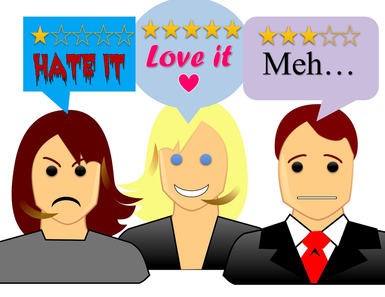 OK, OK, you got a bad review and are panicked. Thoughts of bankruptcy and the poor house become mixed with hurt pride and anger. What to do, what to do? First and foremost, do not take a poor review personally, even if it written as a personal attack. Secondly avoid the temptation to delete it even if you have the ability. Third DO NOT respond in kind. A hateful response to a hateful review only validates the review giving it more credibility. Guest feedback has grown from comment cards to phone-in surveys to online reviews. In today’s over-sharing world reviews are a fact of business life that simply cannot be ignored. Savvy consumers look for reviews, menus and pricing for that new food truck they heard about. Having a poor review or two hurts your business, right?? Not exactly, according to Harvard Business School the majority of consumers trust review content more when they see a mix of good and bad reviews. An astounding 95% of consumers believe reviews to be fake or screened when all they can find are positive reviews. Look at each poor review as an opportunity to build a personal relationship with a guest that could lead to a long term profitable relationship. A poor review could only be one of two things. One is a description of product or service as seen through the eyes of the reviewer. Not necessarily accurate, just their side of events. The other is an attack from a competitor or severely disappointed guest designed to hurt your business. Most likely an exaggeration or complete fiction. In either case, your response to the review defines you and your business to person checking you out for the first time. What impression does your response to complaints leave the reader, your potential new guest? Your response to a poor review will tip the scales for that new guest. Which direction the scale tips is up to you. A hot dog cart vendor in Chicago recently received his first negative review and basically wanted to vent his frustrations to a vendors only forum and seek advice. The review was written on his business Facebook page and he has control over deleting it. The young man in question runs an amazingly clean, attractive cart with inviting signage and an easily read menu board. His surrounding area is clean and the overall appearance his operation is better than many “indoor” restaurants. He is quite friendly and fast with service even when busy. Yet, he received a poor review from a lady purchasing a product he had made 60 of that day. He could not remember the lady specifically but her 300-word essay on the hot dog vendor was a direct attack on him, his quality, pricing and taste. The advice from the forum included the full spectrum of how not to run a successful food business. Everything from “delete it”, “ignore it”, “answer it the same way she wrote it” and the ‘I am a cheapskate pretending to be a business owner’ answer- “just don’t offer her free food she will take advantage of you”. His venting post received dozens of replies and 80% were on the adversarial side of running a business. One would question whether the folks offering advice actually worked in any type of guest service. A closer look at the complaint would, in and of itself, only encourage a prospective guest to investigate the hot dog vendor more rather than blindly say “nope, not eating there”. The reviewer's account had no display photo and it was the only entry on from that FB account. It is unlikely that a person so overwhelmed with poor service and food would start a social media account to post their very first online activity as a blisteringly bad review. The lack of any other activity, photos or comments indicate the review is a complete fake. Strike one fake reviewer. A prospective guest would look at the business’s Facebook photos for a menu to see if the prices were really too high. His prices are exactly in line for the area's economy and with his competition. Strike two fake review. Taste is completely subjective and not a factor unless it is mentioned across several reviews. In his case every review that mentions taste or quality give high marks for each. Strike three, you are outta here faker. Our friendly vendor, once he got over the emotions, answered her review with an apology and an offer to contact him directly and discuss all her concerns in person. Since the vendor did address the review in a professional way, offering an apology and a way to communicate to fix the problem, the review lost all influence over any undecided potential guest. In fact, this review and his response will drive more business to the vendor not away. Your cart or restaurant business should have a policy for handling all guest reviews, regardless of content. Respond to each and every review, good or bad. People like attention and acknowledgement. Only responding to negative reviews makes them stick out more and encourages more of the same.
0 Comments
Your comment will be posted after it is approved.
Leave a Reply. |
Bill MI have had a passion for helping people since an early age back in rural Kentucky. That passion grew into teaching and training managers and owners how to grow sales, increase profits, and retain guests. You’ll find a ton of information here about improving restaurant and food cart/trailer operations and profits. Got questions? Email me at [email protected] Archives
January 2023
|

 RSS Feed
RSS Feed